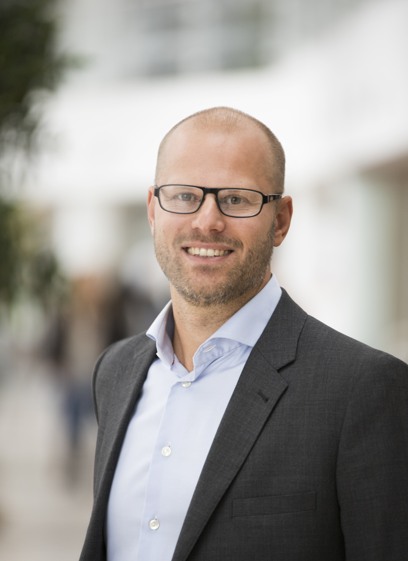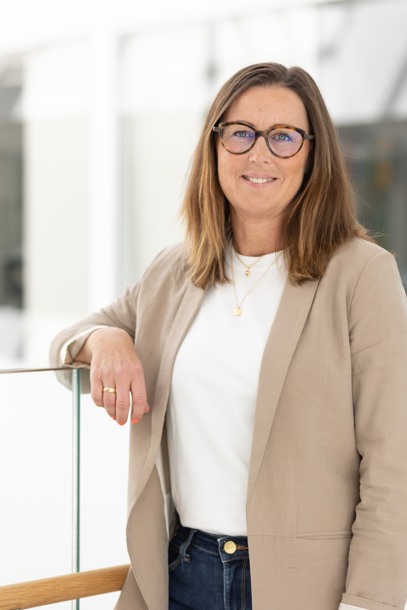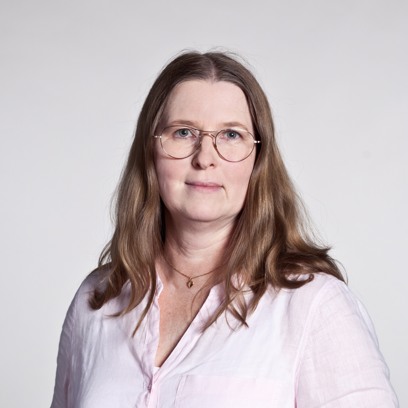The healthcare of the future is centre stage at Vitalis
The Swedish eHealth sector is bursting with innovation. At this year’s Vitalis conference, Halmstad University will be putting AI triage, data-enhanced healthcare processes and digital ecosystems through their paces.

The biggest conference and trade fair on the theme of eHealth in the Nordic countries, Vitalis brings together industry actors and academia in mid-May each year. Halmstad University has focused on this sector in its research profiles and niche degree programmes for a long time now, and this year will be presenting a number of relevant programme items and discussions on the theme.
Petra Svedberg, Professor of Nursing at Halmstad University, says Vitalis is an important arena to attend.
“We want our research to be applied, and it’s hugely valuable for us to get to hear about the needs that exist in society,” she says. “The conference also gives us a unique opportunity to share our research results and experiences with a wide audience and to learn from the experiences, successes and challenges faced by other actors. So networking at events like Vitalis feels really valuable.”
Triage in primary care
One of the tracks Halmstad University will be engaging with at Vitalis is triage in primary care, including presenting a project on the theme of implementing and using the AI-based triage tool Red Robin. The project is based on a number of scientific studies in primary care, an extensive research review, plus interviews with managers, healthcare staff and patients, and has been carried out by researchers from the university’s CAISR Health research profile. Triage is the process of assessing and prioritising patients based on their symptoms and needs and the resources available.

Jens Nygren.
“Red Robin is one of few AI-based triage systems with built-in advanced AI, pushing the boundaries of what is possible. This can help to optimise patient flows in primary care while ensuring patient safety,” says Jens Nygren, Professor of Health Innovation at Halmstad University, and co-leader of the project.
Results have highlighted a number of obstacles in the implementation and use of the triage system. But researchers have also been able to see how healthcare managers, in particular, have developed strategies for tackling them.
“These experiences are something we want to share, to pass on lessons learned from previous implementation. There’s a tendency for different teams to be working in parallel, and so making the same kinds of mistakes, which is why it’s important to be able to support each other’s learning around the introduction of this type of technology,” says Jens Nygren.
Self-triage and online triage
Another similar item on the programme looks at a case study of self-triage using the system Närhälsan online, produced by the Västra Götaland Region when switching between two separate digital triage systems.
“This was a way for the healthcare provider to manage the uncertainty arising out of the transition, and it has been beneficial to be able to study how an organisation deals with a situation where it is felt that patient safety may be at risk. It’s about what you do, how you handle it and coming up with a strategy and a solution that are felt to be sufficiently safe for patients,” says Jens Nygren.
Potential barriers to implementing digital triage will also be addressed. Jens Nygren emphasises that here there is no single standard solution that works for everyone.
“I think you need to several different ways of dealing with patient inflow, because patients will always be different and have different needs,” he says. “You need to be aware that the digital solutions you choose might be extremely accessible for many people but less accessible for some others.”
AI in healthcare
Another of Halmstad University’s tracks at Vitalis revolves around the application of AI in healthcare. Magnus Holmén is Professor of Innovation Science at Halmstad University and is involved in several items on the programme on this theme. He emphasises that the use of AI in the healthcare system comes up against a number of conflicts of interest, such as whether or not data should be open.
“Open data is good in the sense that it gives everyone an opportunity to analyse it and identify problems, but it can also have negative consequences if, for example, patient data is leaked to the wrong people,” Magnus Holmén points out.
In one of the studies to be discussed, he looked at how doctors and nurses use and view AI solutions. While willingness to use AI is partly down to the organisation, he points out that individuals play a part too. However, the results show that use of AI is much more widespread in the health service today than was previously thought, especially at individual level.
“Sometimes healthcare staff are using AI tools without even thinking about it. You know that you are using a tool that produces results but you don’t need to worry about how it’s doing it,” says Magnus Holmén.
Digital ecosystems and scalability
At Vitalis, Magnus Holmén will also be participating in a roundtable discussion with participants from the life science industry, focusing on how the industry can tackle the obstacles that national and regional systems can pose to integrating innovative solutions at global level. He sees it as being about paving the way for a new form of digital ecosystem.
“It must be possible to produce new innovations and achieve profitability across the board, and to do that, you need to look beyond national level,” he says. “The traditional way of organising healthcare provision has changed, partly because of digitalisation. This means that many organisational formats will need to be transformed into new types of relationships, primarily ecosystems in which actors create value through complementary offerings rather than via contracts.”
Magnus Holmén continues by pointing out that how to handle scalability in the healthcare system is a major sticking point. Here, the goal is to make algorithms and data much bigger, so that they work at all levels.
“Then you can work at a much higher scale, and obtain greater competitive advantages and lower costs. But the same problems arise when it comes to procedures in companies and organisations. Today there is a multitude of different types of approaches and databases, and what works in Halmstad might not work at all in Malmö. But if we can manage to get these systems in sync, both nationally and internationally, we will also be able to start looking at much bigger datasets. And that will give us vastly improved results,” says Magnus Holmén.
Data-driven healthcare solutions
Petra Svedberg is deputy project manager of the research profile CAISR Health, which carries out multidisciplinary research into data-driven healthcare solutions, and whose work will be presented at Vitalis. Within the framework of CAISR Health, Region Halland and a number of companies linked to various collaborative projects are focusing on increasing knowledge about implementing and developing AI models that can be applied in the healthcare system.
“It’s about working with public and private actors to identify challenges and needs that can be studied in a multidisciplinary way in collaborative projects. When we started, there was a huge knowledge gap, but over the almost three years that we’ve been running, a lot of things have changed,” says Petra Svedberg.

Petra Svedberg.
One collaborative project involves Region Halland and Mölnlycke Healthcare, which develops and produces medical products and solutions for wound care and surgery, where the goal is to improve the care process for patients suffering from hard-to-heal wounds. The project analyses huge amounts of healthcare data to identify patterns, events and incidents that make it harder for wounds to heal. Interviews are also conducted with healthcare staff and patients to gain a deeper understanding of the data analysed.
“What’s exciting about collaborative projects is that the research arises out of real problems and needs and that it is highly applicable. We share knowledge, perspectives and lessons learned, which means we can tackle complex problems effectively, paving the way for applicable, innovative solutions,” says Petra Svedberg.
AI technology and mental health
Lena Petersson is a Senior Lecturer in health education at Halmstad University and at Vitalis, she will be presenting the results of the PadAI project, run jointly with Capio Ramsay Santé and Region Halland with the aim of using AI technology to more easily predict and prevent mental illness in young adults.
“We are seeing that AI technology can offer major benefits to staff and patients alike.
“Many people in this group of patients can find it difficult to know where to seek help, and here AI can provide support. AI can refer people to the right healthcare provider more quickly, so helping to cut waiting lists and save resources, enabling better care,” says Lena Petersson.
That said, the interpersonal connection must not disappear completely, she points out.
“Obviously, there are both challenges and opportunities here. At the same time, research shows that mental illness is increasing in general, especially among young people, which means there is an urgent need to review the methods that actually exist. Most people living with long-term mental illness experience their first symptoms before the age of 25, so this is a group where it’s especially important to put effective interventions in place,” says Lena Petersson.

Lena Petersson.
AI implementation and challenges
Despite high expectations, the healthcare sector has experienced major challenges in implementing AI compared with other areas of society. Petra Svedberg, who will be discussing this issue in a programme item at Vitalis, sees a number of contributory factors.
“The use of AI in healthcare can be a challenge due to factors to do with transparency, ethics, trust and responsibility. Traditionally, healthcare has been founded on evidence-based knowledge as a basis for decision-making. When it comes to using AI as a basis for decision-making, it’s trickier to see how this approach is to be understood and applied. This can create a sense of uncertainty as to whether AI can live up to the requirement that healthcare must be provided in line with science and tried and tested experience, which in turn can create uncertainty regarding professional responsibility,” says Petra Svedberg.
Picture: Dan Bergmark, Ida Fridvall, Magnus Karlsson and iStock (top picture)
published
Updated
CONTACT
Farzaneh Etminani
share
 English
English